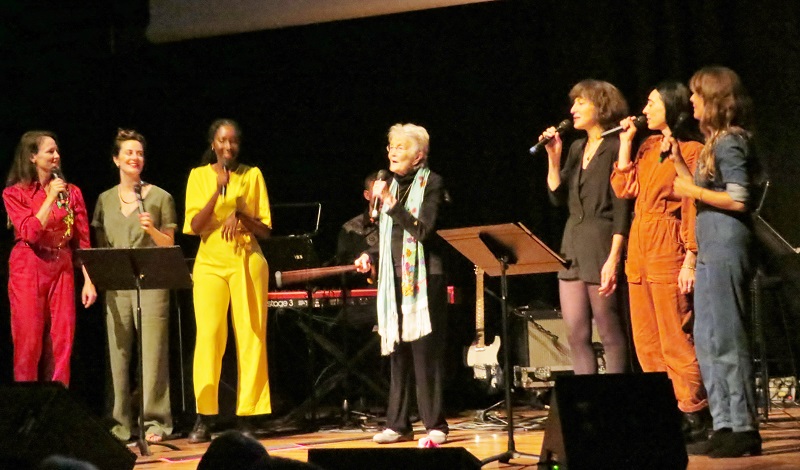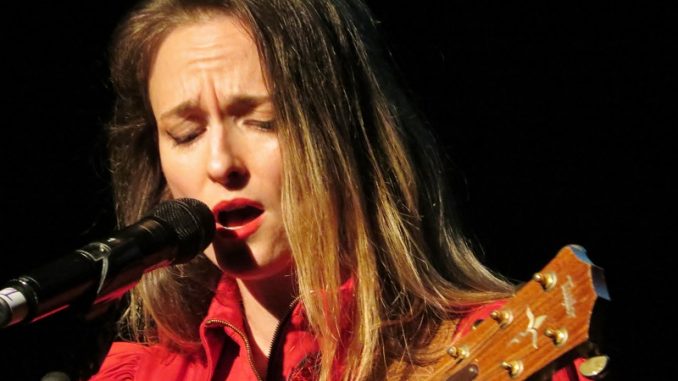
No normal gig this, more of an event – with Dawn Landes’s latest album, ‘The Liberated Women’s Songbook‘ at the heart of it. There’s a band, there are supporting singers and musicians and there are little history lessons along the way in the introductions to the songs (which were sung in a chronological order) as the movement for women’s rights, firstly fought through the suffrage cause, took on wider causes of equality over time. But first was an introduction by Jackie Kay, who has been Scotland’s equivalent of a poet laureate, the Makar, adding some context to what was to come, noting that the publication of tonight’s titular inspiration in 1971 brought together songs that provided a nascent feminist movement with “singing moments that brought about significant political changes.” A movement needs songs – songs that challenge prevailing attitudes, songs that give historical context to a current struggle. Songs, in short, that needed to not be left in printed collections in libraries but instead had new life breathed into them saving them from withering on the page. Alongside this introduction was a partial reading from her poem ‘A Life in Protest’, foreshadowing themes of interweaved protest movements which would emerge through song as the evening proceeded.
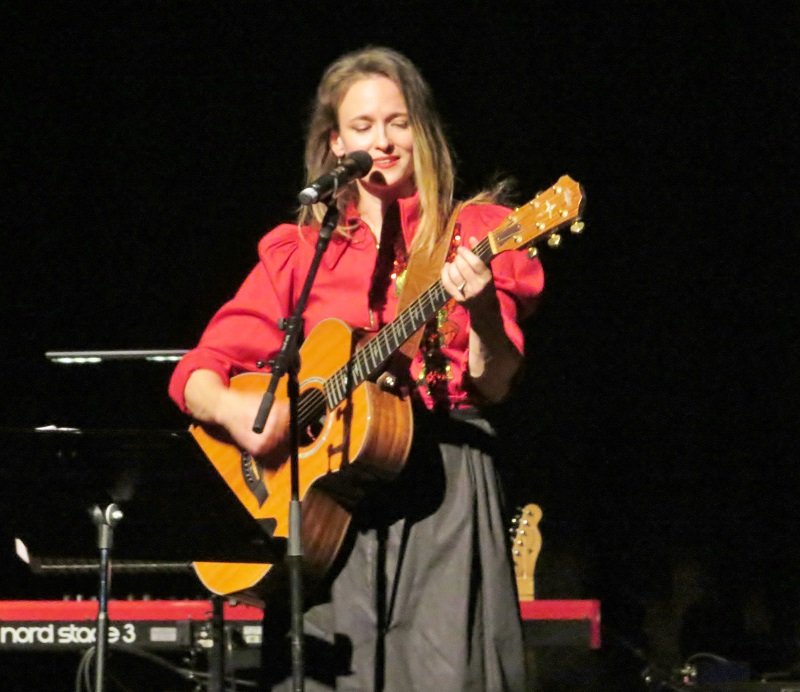
There would be a revolving cast of singers taking the lead at various points included Bridgette Amofah (whom you may recall from the 2018/2019 Hootenanny, where she sang with drum and bass outfit Rudimental), Lail Arad (the London based singer perhaps best known for her Joni Mitchell project), Maguire, folk singer Sylvie Lewis, and indie-folk musician Skylar Gudasz. However, it fell quite rightly to Dawn Landes to lead off the singing with ‘Hard is the Fortune of All Womankind‘ which dates back to the 1830s. It’s a plaintive, lamenting, ballad – often recorded under its other name of ‘The Waggoner’s Lad‘ – which regrets the inequalities of life with women condemned to being “controlled by her parents” until she’s allowed to be “a slave to her husband.” By 1852 though it was possible to imagine – as Fanny Gage an early feminist activist did – that things might improve in ‘One Hundred Years.‘ A misplaced optimism of course as the sprightly arranged song’s dreams are for equality and prisons converted to schools, as humanity evolves to a just and equitable state. Still waiting, of course. It was back down to reality with ‘The Housewife’s Lament‘ with its lilting refrain of ‘Oh life is a toil, love is a trouble / beauty will fade and prices will double‘ – it’s a song that’s a true folk find, having been written in the diary of Mrs Sara A. Price in 1866 who knew something of sorrow as she saw all seven of her children die before her. As a lament it is fittingly given a beautiful, mournful, fiddle accompaniment.
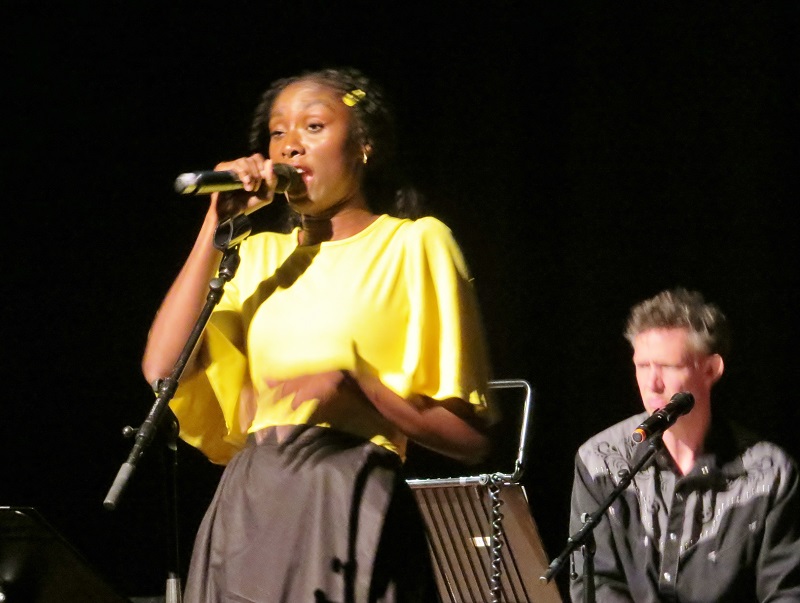
As the 19th century progressed and rolled over into the early 20th century the clamour for the right to vote rose, the songs took on a more strident call for change, ‘Keep Woman In her Sphere‘ makes the convincing argument that only reactionaries and drunkards could fail to see the rightness of the cause, which the “modern man” obligingly, if somewhat unconvincingly, does. Songs of unequal employment rights such as 1906’s ‘The Factory Girl‘ still stumble a little on the path to the future as the way out of penury in the factory is to “marry a country boy before the year is out.” A string of unionising songs, accompanied on screen by early filmed images of women marching as organised labour, recognised a shift in women’s life chances ‘Bread and Roses‘ made the case for enough to live on and enough more to make life worth living, an argument echoed on the nicely syncopated group singing of ‘Mill Mother’s Lament‘ which came out of a 1929 textile workers strike. The first set closer of a very funky ‘Which Side Are You On‘ is a triumph – it’s simply one of the greatest Union songs of all time, here cleverly coupled with Aunt Molly Jackson’s ‘I am a Union Woman.‘ It’s suitably rousing and it does lay out the simple question “The bosses ride big fine horses, while we walk in the mud / Their banner is the dollar sign while ours is striped with blood / Which side are you on?”
The second half of the gig went further into the inspiration for Dawn Landes’ new album, there being only two songs from the album still to be sung. Lesley Gore’s big hit ‘You Don’t Own Me‘, albeit written by men, was for 1963 a big feminist anthem for sexual equality, with its dramatically sung plea to just be treated equally “I don’t tell you what to say / I don’t tell you what to do / So just let me be myself / That’s all I ask of you.” The plea for equality conveyed through six voices blending on ‘Liberté, Egalité, Sororité‘ was a surprisingly formal almost choral moment which couldn’t be an accusation made at ‘There Was A Young Woman Who Swallowed A Lie‘ which gleefully rewrites the nursery rhyme to undercut the propaganda of the patriarchy – it’s a folk tongue twister of rejections by the final verse.
‘Liberation, Now‘ saw the six women perform a reverse Bucks Fizz – removing the long skirts they’d worn all evening to reveal liberated trousers and a banner reading Liberation Now! And the theatrics continued into the rousing finale of ‘Move On Over’ (sung to the tune of the ‘Battle Hymn of the Republic’) which had the new words flashed on to the screen to allow for a sing-a-long, whilst Dawn Landes led her fellow musicians into a march around the hall.
Appearing as the evening’s encore, Peggy Seeger sang her musical protest biography a cappella, and discussed feminism with Dawn Landes, at the same time dropping the sizeable ironic bombshell that ‘The Liberated Woman’s Songbook‘ was collated and written by prolific folksinger and musical tutor author Jerry Silverman. Peggy Seeger’s recollections of him, although fond, also hinted that he wasn’t the sort of singer who’d be invited to join the Critic’s Group. No matter – he had gathered several dozen songs together and provided them with chords and notation for the melody. It was, Peggy Seeger noted, a strange collection saying that it had some great songs and it had some shanties which are “amongst the most misogynistic songs” in folk music.
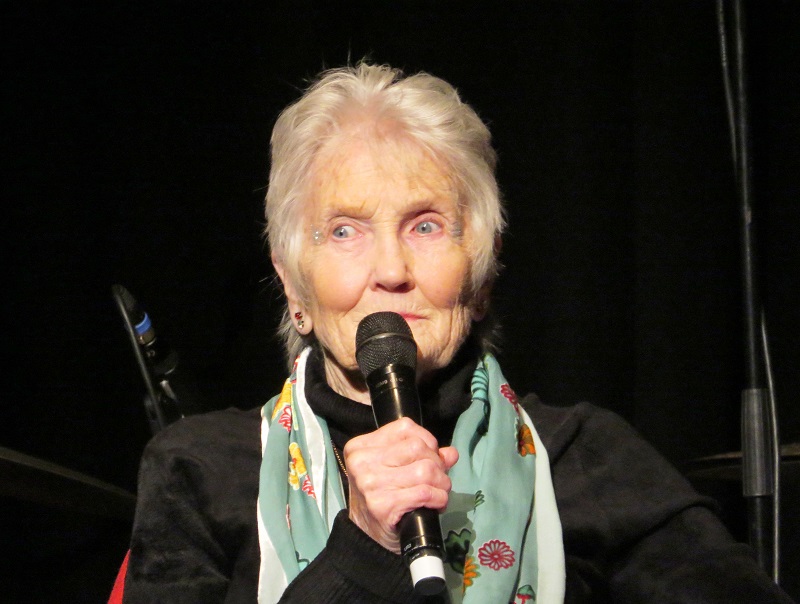
A second snippet conveyed in Seeger’s praise for the musicality of the ensemble was that “they only had one rehearsal” – it had been an amazingly together and mostly smooth evening considering the various comings and goings, historical readings, visual inserts and theatrics that it had involved. A final couple of thoughts was that there’s clearly a need for an expanded album – or a volume two release to cover more of the songs, and also surely that this was a format perfect for tweaking into a “Radio Ballad” format? Let’s hope that Dawn Landes’ agent is talking to the BBC.
